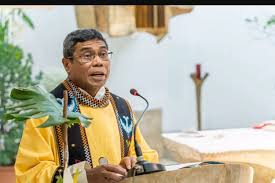Archbishop of Ende: no to geothermal plants on Flores Island
Strong stance by Archbishop Msgr. Paulus Budi Kleven in defense of pristine lands that the Jakarta government wants to turn into a hub for new nationally significant “development projects” on the predominantly Catholic island. Local farmers' concerns.
Jakarta (AsiaNews) - Archbishop Paulus Budi Kleven, archbishop of Ende in Flores, Indonesia's predominantly Catholic island in eastern Nusa Tenggara province, has publicly expressed his opposition to plans to build geothermal power plants in Mataloko and other locations in his diocese's territory.
A statement that is attracting a great deal of attention from groups fighting for environmental protection. Archbishop Kleven's is in fact the first explicit voice of Indonesian Church leaders against projects that are potentially harmful to the ecosystem and the social life of local communities.
“Having listened to the concerned voices of the people and other stakeholders, I feel morally bound to express my strong rejection against any geothermal site project in some locations within our pastoral territory of Ende,” said The prelate (appointed by Pope Francis a few months ago after serving as superior general of the Verbites) in a video message released last week.
“Having listened to dozens of people on the ground from Sokoria to Mataloko and the local clergy, I have no doubt in declaring as the leader of this Church my opinion,” the archbishop added in a gesture that is part of that attention to the issue of the environment urged by Pope Francis in his encyclical Laudato Sì.
Since 2017, Flores Island has been officially declared by Jakarta as a potential site for exploration of sites suitable for geothermal plants. There are reportedly 17 projects among which some have already been attributed to the Daratei and Mataloko locations in the Ngada area.
A wave of actions have been taken in recent years by investors and other parties to push local chiefs and church leaders themselves to support so-called national strategic projects.
Those affected are mountainous territories that represent true natural paradises, but where forms of degradation are already increasing in the name of economic “development.” Residents report threats to public health, but also phenomena such as the deterioration of the condition of houses due to unwanted materials and the decrease in the fertility of farmland.
“Farmers in Mataloko have submitted their complaints about the serious decline in the harvests of coffee, cocoa, maize, vanilla, vegetables, avocados, and cloves,” reads a report by some environmental associations.
Against this backdrop, Bishop Kleden urgently calls on local priests and leaders to mitigate all the serious effects caused by these projects, calling for strong resistance against any mining initiative that would harm the environment and people's community life.







.png)










